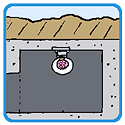|
EvanSchenck posted:In actuality Rommel was a tactically brilliant general with outstanding facility for mobile warfare. He was also a major figure in developing the German infantry during the interwar period. People sometimes overlook this because tanks are more exciting and cool, but the outstanding quality of the German infantry had a great effect on the course of the war, particularly in how much staying power the Germans had after they were pushed back onto the defensive. I don't know to what extent you can give Rommel the credit for this, but he should come in for some of it. Rommel did sort of write the book on infantry tactics, http://www.amazon.com/Infantry-Atta...nfantry+attacks That was based on his outstanding successes commanding mountain infantry in Italy in WW1.
|
|
|
|

|
| # ? Jun 10, 2024 15:21 |
|
We need some more WW1 Italy stuff here. I know crap about the involvement of minor states in the first world war other than Portugal. In case you want to know we were too poor to send soldiers to France so we had to wait for the British to transport us, then we had a coup by a Germanophile who wanted to send the troops back, when this was deemed unnaceptable both by the Entente and by the populace in general he refused to pay attention to what the troops needed causing our troops to be constantly under supplied and undermanned because anyone, mainly officers, who had permission for leaves, even if only a day long, would do their best to flee and hide in the mountains, making our troops pretty much a bunch of mal-nourished foreign troops with no knowledge of English (we have a name for foreigners here, they're called "camones", because during the war our soldiers knew zero about English and only knew the English were talking to them when they started shouting "come on!"  ) then our army mutinied and after they received permission to be removed from the frontlines the Germans decided to attack their area in force (La Lys) just two days before they were to be sent off the frontline. Our army was devastated and the retreat was so severe that it caused a massive gap in the defensive lines, which actually helped the Entente by over-extending the German lines. We were also attacked in Mozambique, where we grinded the Germans to a halt and let the climate devour the Germans AND a few of our lads aswell. When the war was over we were still too poor to transport our soldiers so they had to wait a few months before the British had the resources to ship them back to Lisbon. It wasn't the best war for us. ) then our army mutinied and after they received permission to be removed from the frontlines the Germans decided to attack their area in force (La Lys) just two days before they were to be sent off the frontline. Our army was devastated and the retreat was so severe that it caused a massive gap in the defensive lines, which actually helped the Entente by over-extending the German lines. We were also attacked in Mozambique, where we grinded the Germans to a halt and let the climate devour the Germans AND a few of our lads aswell. When the war was over we were still too poor to transport our soldiers so they had to wait a few months before the British had the resources to ship them back to Lisbon. It wasn't the best war for us.At least we got a "hero". Anibal Milhais held off two entire German regiments by himself with a machine gun, then got lost and ate only almonds for three days in a row and saved a drowning Scot. http://en.wikipedia.org/wiki/An%C3%ADbal_Milhais Bagheera posted:
I won't say leftism is dead in Europe or the U.S., but the I.M.F. has brainwashed enough people to make it a pretty hard thing to rise up. The only hope of the left is in South America. Africa is Chinese, the Middle East is bombed and India and China are profiting too much from western neoliberaism to oppose it too much.
|
|
|
|
Wow. I only knew Portugal was involved in the Great War because they're sometimes featured in those encyclopedias of uniforms. I had never read an account of their actual participation. I assumed it was like Japan where it was mostly moral support and fighting in the colonies, I had no idea that green troops had to face the Kaiserschlacht . e: What did Portugal do during the Spanish Civil War?
|
|
|
|
DerLeo posted:Why does Rommel have the reputation he does anyways? His track record seems to be less than successful. That he "failed" in North Africa I think wasn't entirely his fault. The Germans needed 4 mobile/armored divisions to drive to the Suez, could only provide 2 to Rommel, and could only supply 1.
|
|
|
|
bewbies posted:Part of it was that he, accurate or not, has been presented as one of the few German officers of decent character from that era, so the hordes of WWII German historians tend to trot him out a lot as an example. Part of it is due to the in-war propaganda by the Nazis, who quite successfully portrayed him as the world's pre-eminent military officer. Accurate or not the allies bit this hook line and sinker and as such the legend entered the pantheon. In my opinion he was probably the best armor commander and the most tactically competent officer of the war, but he was not an adept strategic thinker and so was quite in over his head when working at the operational level and above. Perhaps there is also that he commanded German and Italian forces in North Africa during a phase when British propaganda still thought it was okay to show respect to your enemy military. And this was also the perfect setting for Rommel's reputation to grow: population was too sparse for any tragic 'incidents' to happen which could have tarnished his reputation, the natives didn't give a poo poo about the war so it was an equal "gentlemen's war" rather than something like the defense of Belgium, the scale of operations was optimal for his abilities and the terrain allowed for swift maneuvers across enormous areas, which always looks good in newspapers. Of course, occupying a plot of rocky desert the size of England is strategically worthless. But it's golden for propaganda. It also adds to his aura that Brits tried to assassinate him several times and that his forces captured O'Connor who at that time was seen as one of the few successful British generals. Had Rommel not been appointed to lead the Afrika Korps then he would not have become any more famous than any of the other brilliant German generals such as Heinz Guderian or Albert Kesselring who for the large public are unknown.
|
|
|
|
Speaking of Georgy Zhukov, he seems like such a nice guy.wikipedia posted:Zhukov ordered the executions of several inadequate officers, thus strengthening the siege perimeter. To bolster resistance, Zhukov organized a special armed regiment that was empowered to shoot anyone who retreated from the perimeter.
|
|
|
|
Interesting tidbit, what with the communism chat and Zhukov getting mentioned. Marshal Ivan Konev said after the death of Stalin that in his opinion, Stalin's purge of the Soviet military didn't hurt their capabilities at all. In his opinion, the vast majority of those who got purged were either out of touch with the emerging military realities and the purge would have needed to been carried out in some way to enable the Soviet Union to win WW2.
|
|
|
|
Kemper Boyd posted:Interesting tidbit, what with the communism chat and Zhukov getting mentioned. Tukhachevsky basically wrote the Soviet deep battle doctrine that won them the war so Konev is kind of wrong on this one. Stalin purged dead weight but he also purged geniuses too, geniuses whose contribution the Red Army needed to do what they did. Bagration probably doesn't happen without Tukhachevsky's writings per-war. gohuskies fucked around with this message at 07:48 on Aug 14, 2012 |
|
|
|
Revolvyerom posted:Speaking of Georgy Zhukov, he seems like such a nice guy. Pretty much anybody who mattered in USSR during the 1930s and 1940s had worked in some capacity for the Red Army during the Russian Civil War. That was the time when supporters of the Bolsheviks stepped up and distinguished themselves and started to build their future careers. I feel like this is useful for understanding the brutality of their conduct towards their own soldiers in WWII. Zhukov cut his teeth as a leader in a vicious civil conflict where most soldiers were poorly trained at best, atrocities were commonplace on both sides, and most problems were solved with summary execution. Captured some Tsarist aristocrats, what to do with them? Kill them. Soldiers lack discipline? Make some examples. I think once they'd gotten through the Civil War, killing people as a first resort was just expedient and habitual, so they kept doing it.
|
|
|
|
Kemper Boyd posted:
I don't buy it. Many of the Generals that won WW2 for the Soviets were imprisoned, tortured, or nearly executed at different points during the purge, Zhukov included. I can't remember his name but I seem to remember one key General getting pulled off the line, tortured, had all his teeth knocked out, then was re-instated when they realized they needed him for the air force to function properly. Anyway I think if the purge had gone any further than it did the Soviets would have a lot difficulty than they already did finding competent commanders.
|
|
|
|
Flippycunt posted:I can't remember his name but I seem to remember one key General getting pulled off the line, tortured, had all his teeth knocked out, then was re-instated when they realized they needed him for the air force to function properly. Konstantin Rokossovsky, hero of Stalingrad. He had the misfortune of having been born in Poland so of course he was a Polish spy. After the war Stalin put him to supervise the new communist government in Poland. Poles did not take this well, leading Rossy to note: "In Russia, they say I'm a Pole, in Poland they call me Russian." e: though you must mean someone else since he had nothing to do with the air force. Nenonen fucked around with this message at 08:24 on Aug 14, 2012 |
|
|
|
Regarding Rommel, he also led the famous Ghost Division during the invasion of France in 1940, becoming the poster boy for blitzkrieg in both the German and Allied consciousness. A fascinating thing about Rommel is that he was another case of "nepotism" within the nazi apparatus. Prior to France, he had never commanded tank formations and basically got his command because Hitler liked him. He could easily have turned out to be another failure like Göring, and instead he showed himself a natural at tank warfare. E: Fuckit, have a metal song about the 7th Panzer: https://www.youtube.com/watch?v=2xYzQ-SRs4g Mr. Sunshine fucked around with this message at 09:23 on Aug 14, 2012 |
|
|
|
For all those commanders, I rarely see any mention of Field Marshal Slim. I have too little time here at work to sum anything up so that wikipedia article will have to suffice.
|
|
|
|
Oxford Comma posted:Also he tried to blow-up Hitler, so people who embrace the myth of the clean Wehrmacht are enamored with him. How much blood did the Wehrmacht have on it's hands?
|
|
|
|
Boiled Water posted:How much blood did the Wehrmacht have on it's hands? Short answer: a whole shitload.
|
|
|
Boiled Water posted:How much blood did the Wehrmacht have on it's hands? Your going to have to be a little more specific as they were the army of the aggressor. I'm assuming you mean innocents right? Mans thanks for sharing us what you know about Portugal in the Great War. Sadly they seem to have been almost forgotten  . .And yeah, because of that horrible Civil War the Soviets only knew that mindless bloody brutality solved most problems.
|
|
|
|
|
I been reading the wiki page of Alexander the Great but despite having a son (who later died to poison) his entire empire collapsed. But then I had a thought. Considering the rather quick actions of his generals ripping the empire apart, would it have a chance to last more than 50 years? After all Alex made an empire within 20 years where the Persian Empire took far longer than that. You also got to remember that his son wasn't of age at Alex's death but if he did live to become of age, would he even have an empire or history will still refuse to change? In other words, Would the Macedonian Empire collapse no-matter what?
|
|
|
|
Alexander died only seven years after Darius, which isn't much time to consolidate your conquests into a new empire. If Alexander had not died then and there? I guess we will never find out
|
|
|
|
Frosted Flake posted:Wow. I only knew Portugal was involved in the Great War because they're sometimes featured in those encyclopedias of uniforms. I had never read an account of their actual participation. I assumed it was like Japan where it was mostly moral support and fighting in the colonies, I had no idea that green troops had to face the Kaiserschlacht . During the Spanish Civil War, Portugal itself was basically a fascist regime (i.e. authoritarian, one-party rule, etc.). As you can imagine, they supported Franco in the war. This support mostly took the form of being the area where supplies were shipped in. It was very important to Franco since Germany and Italy had signed the Non-Intervention Agreement so they couldn't directly supply aid to the Nationalists and instead funneled it in through Portugal who refused to allow foreign observers in. The Portuguese themselves also provided some munitions and weapons and about 10,000 volunteer soldiers, though I don't know if they did anything of note (probably not). Salazar also set up a special police force and purged the government of anyone deemed politically unreliable.
|
|
|
|
Boiled Water posted:How much blood did the Wehrmacht have on it's hands? http://en.wikipedia.org/wiki/War_crimes_of_the_Wehrmacht Standard Wikipedia disclaimer, use it as a quick overview and a basis for further reading.
|
|
|
|
Dopilsya posted:During the Spanish Civil War, Portugal itself was basically a fascist regime (i.e. authoritarian, one-party rule, etc.). As you can imagine, they supported Franco in the war. This support mostly took the form of being the area where supplies were shipped in. It was very important to Franco since Germany and Italy had signed the Non-Intervention Agreement so they couldn't directly supply aid to the Nationalists and instead funneled it in through Portugal who refused to allow foreign observers in. The Portuguese themselves also provided some munitions and weapons and about 10,000 volunteer soldiers, though I don't know if they did anything of note (probably not). Reminder that as bad as Salazar was he wasn't a fascist, he was a conservative. The help of Fascist Spain was about crushing the "threat" of unions, communism and anarchism while grabbing as much $$$ as he could by being the supplier of toys for the Spanish. He hated the military minded governments of the rest of Europe and found their anti-catholic stances deplorable (Franco was different in that he got the Fascism of Central Europe and the conservatism of Salazar). I'd call the Portuguese involvement in both the Civil War and WWII opportunism. Salazar did what would profit him the most and went to great lengths to maximize his profits, even risking some quite serious reprisals. After Franco won the war, he was somewhat keen on approaching himself to the Italians and Germans while Salazar knew that a war would devastate the Iberian states and lose them their colonies. I'm not sure how great of an impact he had on Franco, but national thought is that Salazar was the main reason why Franco didn't ally himself with the Axis after the fall of France. Moreover, Portugal supplied everyone (except the Soviets) with resources, naval and air bases and headquarters for as much money as could be extracted. We received a lot of Jewish gold, we sent back a lot of Jews attempting to flee Europe (although a few good men did their best to save as much Jews as possible), we sold the Germans vital resources to create tanks and munitions, while we also received a lot of military equipment from England and got a few coins from renting our air and naval bases in the Azores to the Americans (which we would lose permanently if Salazar went to war against the allies). There's a funny anecdote about this two way schemes. In 1944 with the Allies in France, Churchill approached Salazar personally to order him to stop feeding the German war machine, even threatening with war against Portugal. Salazar replied that he wasn't feeding the German war machine against England, but giving Germans the resources to kill as much Soviets as possible. Allegedly Churchill silenced his protests and never bothered Salazar again about it. Salazar's hands off approach gave him a cult of personality only rivaled by Stalin. Whenever we had "elections" during his life, he rode the gravy train of saving Portugal from the war (even when we were dying in Angola and Mozambique) and that his actions "filled the state coffers with gold", something that is still said by right wing people in my country. His(and Franco too) anti communist stance was so great that he and Franco were allowed to keep on trucking in the post war world as two brutal dictatorships who held on to colonies ruled by force while the west defended the rights of the people and liberty and all that gobledy gook they spoke about when talking about fighting the Nazis. Portugal was a vital member of N.A.T.O. and Lisbon was the permanent home of many spies because of it's strategic location. His economic actions are still quite alive in Portugal, with state favoritism of a few "good" families that rule the entirety of the economy and having complete rule over the government, this being the main reason why the austerity programs were put in pratice with "applause" from the Germans and the I.M.F., it's easy to implement neoliberalism in a country that never had any intentions of being anything else. Boiled Water posted:How much blood did the Wehrmacht have on it's hands? No one had "washed hands" in WW2. It was a brutal conflict and only the most ruthless could survive. The Werhmacht had some good men in them, who saw the war as simply a tatical and strategic necessity and not ideological, there was even one who ordered his troops to attack the Wiking SS division (anyone knows the name?) but in general they were sent to the front with a ideology to defend, an enemy extremely demonized and witnessing a few too much horrors not to snap and commit atrocities in revenge. Mans fucked around with this message at 16:22 on Aug 14, 2012 |
|
|
|
Nenonen posted:Alexander died only seven years after Darius, which isn't much time to consolidate your conquests into a new empire. If Alexander had not died then and there? I guess we will never find out So no-one really knows overall? That was the answer I was expecting. It's a bit too far back and even if it did it might have not have lasted long against the Romans. When I hear about the Victorian Era, how much of what we really know was bullshit and what wasn't? Western culture seems to look favorably at the era but is that more due to the bullshit they made up to better themselves or was it really a prosperous time where human rights and liberty was being formed and governments started listening to them? (I live in the UK where my school teached us a lot about The Empire.None of the genocide though only the "good" bits.) Also can someone tell me how the Great Clusterfuck of 1846/48 happen and what was the breaking point? I remember making a comment about it when the Arab Spring was just beginning to happen a year ago. It felt like it was being repeated and I expected it to crash and burn. Thank god it didn't. Supeerme fucked around with this message at 17:09 on Aug 14, 2012 |
|
|
|
Supeerme posted:So no-one really knows overall? You're talking about contrafactual history, by definition no one knows. And the list of first hand sources describing Alexander's politics is so short that it's almost easier to tell what would have happened had the July Plot killed Hitler. No, don't ask what would have happened.
|
|
|
|
Boiled Water posted:How much blood did the Wehrmacht have on it's hands? What Wehrmacht apologists like to say: https://www.youtube.com/watch?v=8105U1WY9ro
|
|
|
|
Nenonen posted:No, don't ask what would have happened. Fair enough. I was musing aloud.
|
|
|
|
Bagheera posted:I think there's a big disconnect between Latin leftist movements today and those prior to 1990. There are two key differences that affect their survivability today. I really disagree about the disconnect- you're thinking in a globalist tradition while leftism in the Southern Cone tends to be very very regional. Che is revered everywhere, sure, but most countries in the area have their own native leftist movements that in many cases have been active for decades. The Zapatistas are an excellent example, as are the various rebel groups in the countries north of Amazonia. Not all of them were beneficiaries of Soviet aid, and the KGB presence in South America actually kind of mirrored the CIA/School of the Americas model, with lots of locals that would go off and get training from from foreign agents and then return to their home countries and continue developing their organization. On top of all that, there's a really distinctive character to South American leftism as part of the regional identity. I mentioned the universal regard for Che (Chavez always talks about how great Che was, the Shining Path love Che, Chileans put Che up alongside Allende in their leftist pantheon), and the Southern Cone regionalism of the 70s is still largely intact when it comes to South American relations. The centuries of outside intervention, first from Spain and then from the United States, as well as the fact that land reform has always been one of the biggest popular movements on the entire continent means that Marxism has some naturally fertile ground and also acquires a distinctive regional character. Also, loving lol at calling the Central and South American interventions during the Cold War "un-American acts". The Monroe doctrine basically enshrined it into our national identity before we were 50 years old and Teddy Roosevelt took it to the point of outright colonialism. It's about as American as you can get.
|
|
|
|
Supeerme posted:So no-one really knows overall? That was the answer I was expecting. It's a bit too far back and even if it did it might have not have lasted long against the Romans. If he did die, but his son was of age, there would still be a bunch of variables. What if he was an idiot? What if nobody respected him and he had zero charisma? His empire would collapse faster and into more pieces than what really happened. Maybe Alexander's generals wouldn't care either way and just get rid of him - like they actually did. Or maybe he would have been every bit as brilliant as his father and would keep the empire in his hands, but he'd probably face the same problems as his father would've. All things said, it's a bit unfair to say the empire collapsed. It split up, yeah, but it didn't just revert to the previous state of affair. Although unity was lost, it did herald the start of the Hellenistic period and end up with a bunch of Greek-Macedonian dudes at the helm of some pretty huge kingdoms and empires. quote:When I hear about the Victorian Era, how much of what we really know was bullshit and what wasn't? Western culture seems to look favorably at the era but is that more due to the bullshit they made up to better themselves or was it really a prosperous time where human rights and liberty was being formed and governments started listening to them? But even in Europe and North America, you were still more likely to get hosed over than not. It wasn't a great time to be an ordinary working class guy. Or a farmer, for that matter. Work conditions in the cities were horrendous - for men, women and children. If you were poor, you basically barely had any rights - you certainly couldn't vote. Diseases ran rampant. Things were generally very, very poo poo. But if you were rich and upper class, then yeah, you could say it was a pretty swell time.
|
|
|
|
Rommel apparently also had massive benefit from intel that he got from broken American codes. Still a very competent commander. http://en.wikipedia.org/wiki/Bonner_Fellers
|
|
|
|
Nenonen posted:Konstantin Rokossovsky, hero of Stalingrad. He had the misfortune of having been born in Poland so of course he was a Polish spy. There's an amusing passage about an exchange between him and Stalin in Montefiore's book about Stalin. "Stalin asked one of them, Konstantin Rokossovsky, perhaps noticing his lack of fingernails, 'Were you tortured in prison?' 'Yes, Comrade Stalin.' 'There're too many yesmen in this country', sighed Stalin."
|
|
|
|
R. Mute posted:But all things considered, it's pretty unlikely that the empire would've stayed a single, monolithic block - even if Alexander survived. It was just simply too big. Incidentally, what held the Persian empire together until those uppity Hellens started stirring up trouble? Was it just a matter of military supremacy over the dominions?
|
|
|
|
R. Mute posted:But if you were rich and upper class, then yeah, you could say it was a pretty swell time. The best thing that can be said about the 19th century is the rights gained by upper class white men in Europe and North America, together with the technologies developed to enrich them and make their lives more comfortable, spread out and are being gradually acquired by others. Of course, most people on Earth are still poor and lack human rights, and the consequences of some of the technology are still being worked out (i.e. global warming). "Nenonen posted:" post="406541466"] Incidentally, what held the Persian empire together until those uppity Hellens started stirring up trouble? Was it just a matter of military supremacy over the dominions? More or less. The Persian Empire was actually effectively ruled as a series of largely autonomous satrapies under the suzerainty of the Achaemenids. Satraps were obliged to send regular tribute to Persepolis and contribute troops to Achaemenid campaigns as needed, but otherwise they functioned as kings within their own territory. The Achaemenids took the title "Shahanshah," meaning "king of kings." This was really the only way to run a large and diverse empire with limited lines of communication. Rebellions by Satraps happened from time to time, but were kept in hand by the Persian's military power--i.e. the proximate cause of the Greco-Persian conflict was Athenian support for a revolt in Persian Ionia. As to Alexander, he gave the impression before his death that he didn't actually intend to change the Achaemenid Empire, he just wanted to move his own dynasty in and place his Macedonian cronies in the top positions. If he had lived into old age, it's conceivable that he might have accomplished this and a Hellenic/Persian Empire could have emerged. But, given the fractious nature of the Macedonian nobility and their apparent lack of interest in becoming Persians, it's just as likely that he would have died and the whole thing would have fallen apart much as it did in the real timeline.
|
|
|
|
The premature death of Alexander deprived the world of what would be the best part of the mixture between Greeks and Persians: phalanx horse archers. The world is a poorer place because of it.
|
|
|
|
Nenonen posted:Incidentally, what held the Persian empire together until those uppity Hellens started stirring up trouble? Was it just a matter of military supremacy over the dominions? The Achaemenid Persian Empire was a piece of bureaucratic and political art that functioned with some seriously impressive elements to it. EvanSchenck covers much of it but as one example of what they managed to do, they had an extremely advanced road network and courier service that allowed them to get news across the empire in a matter of weeks (If I recall correctly, it would take about two weeks to get news from Sardis to the capital at Persepolis) and several of their other achievements are similarly noteworthy. Of course ruling a diverse, large empire is never easy and Alexander inherited one of the finest militaries of the era thanks to his father Phillip II's reforms and conquests, and combined with his own peerless abilities and the luck of striking at a time of internal discord he was able to smash the Persians pretty soundly. As to the earlier question of what does Alexander do next, it's impossible to get anywhere without making the big assumption in answering "What does Alexander do next?" Does he want to instate himself as ruler of a Hellenic-Persian Empire and be satisfied as a new Cyrus? Does he want to conquer still more? My own instinct is that he was committed to conquest but the extent to which he would manage this if the empire began collapsing in his wake is unknown. Many of his soldiers had grown tired of war long before he died, the Greeks back home were growing pretty unhappy about the whole adopting Persian customs shtick, and of course nobody was too pleased about being violently conquered. The huge problem though is that we don't know what sort of skills Alexander had as a diplomat and administrator. His father Phillip II might have been able to establish a sustainable empire given Alexander's conquests but Alexander had spend his entire adult life conquering. Maybe he would have proven as genius at administration as he was at warfare, but if he was merely competent or worse it would have been hard to secure the empire in the long term. Still, it's not like 30 is too young an age for more kids.
|
|
|
|
To be honest ruling the Empire would be as hard as adapting the old system. It worked as good as it could possibly be.
|
|
|
|
Can someone sumerize/tell us about Louis Mountbatten's serice during World War 2? Didhe make any signifigent contributions to the Allied/British military during the war or post-war?
|
|
|
|
Has killing your own troops to motivate the rest ever been a good strategy?Mr. Sunshine posted:Regarding Rommel, he also led the famous Ghost Division during the invasion of France in 1940, becoming the poster boy for blitzkrieg in both the German and Allied consciousness.SRs4g[/video] I thought it was the Allies who had the Ghost Army. Called such because it wasn't real. If only Hitler had some meddling kids and a talking dog...
|
|
|
|
Mans posted:To be honest ruling the Empire would be as hard as adapting the old system. It worked as good as it could possibly be. Adapting the old system was actually already under way, Mithrenes was made Satrap of Armenia, which was hardly an insignificant post.
|
|
|
|
Frosted Flake posted:..., Germans love Rommel... Not to be pedantic, but you are aware adoration of Nazis is generally frowned upon in modern Germany, yes?
|
|
|
Nckdictator posted:Can someone sumerize/tell us about Louis Mountbatten's serice during World War 2? Didhe make any signifigent contributions to the Allied/British military during the war or post-war? He 'helped' with the Dieppe Raid.
|
|
|
|
|

|
| # ? Jun 10, 2024 15:21 |
|
Of all people, a left-leaning band from Finland would write an ode for Rommel. https://www.youtube.com/watch?v=NMjkGysWO2E if you lived today you wouldn't interest me a bit you would be an engineer or a soldier and I'm a humanist, you did not understand art seeing a pretty closter you said you'd make it a bunker you lived in time of violence and your profession was war every day you sent thousands to certain death yet you were greater than the brutal time around you you fulfilled the hardest command - love your enemy :when politicians and humanists were quiet you stared Hitler in the eye and called him a criminal you had an ordinary brain but you thought for yourself too honest people are also murdered today with certainty: the devil sent a telegram to your funeral: your great victories would be remembered in history you would not care for that - you were greater than history demanded in the age of violence you were just a human human...
|
|
|



































